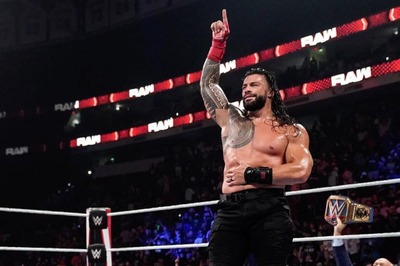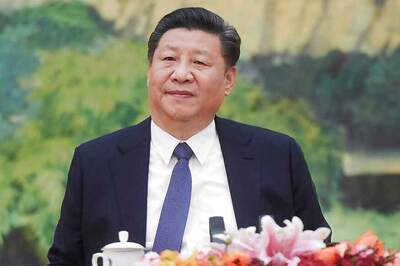
views
Xi Jinping, after a significant hiatus of half a decade, recently visited Europe, meeting with the leaders of France, Hungary, and Serbia—Emmanuel Macron, Viktor Orban, and Aleksandar Vucic, respectively. In addition, he participated in a trilateral dialogue with European Commission President Ursula von der Leyen and French President Macron. This visit, his first since the onset of the Russia-Ukraine war, signals potential political shifts, particularly as it involves Europe’s most resolute ally of Russia.
Although President Ursula von der Leyen expressed hope that China would leverage its influence to quell Russia’s aggressive actions against Ukraine, the meetings yielded no substantial outcomes. It’s also crucial to acknowledge the growing tensions between Europe and China, with Europe increasingly focusing on reducing its dependency on China amidst the ongoing US-China trade conflict and disruptions in global supply chains following the Covid pandemic.
Changing Facets of Europe-China Relations
China and Europe are each other’s largest trading partners, yet the relationship is marked by a significant trade imbalance, favouring China. Recent data from the European Union reveals a staggering 300-billion Euro deficit in trade with China. In 2019, the European Union labelled China a ‘systemic rival,’ a relationship further strained by the pandemic. This tension is fuelled in part by the ongoing trade war between the US and China and in part by the stark contrast between China’s labour and trade practices and those upheld by the EU.
The European Union, the world’s largest and most influential trading bloc, champions democracy, human rights, and transparency as its core values. Committed to fair trade, the EU advocates for dignified wages for all workers. In stark contrast, China operates under an authoritarian regime that shows scant regard for human rights and fair labour standards, facing allegations of forced labour in Xinjiang. Attracted by low labour costs and high returns, Western investors have made China a pivotal node in the global supply chain, alongside other Asian powerhouses like Japan and India.
Numerous experts have described China’s economic ascent as a ‘peaceful rise,’ yet this perception has shifted under Xi Jinping’s leadership. Following the initiation of the ambitious Belt and Road Initiative, China has found itself embroiled in several conflicts with neighbouring countries and Western nations. Notable among these are the South China Sea dispute and border tensions with India.
Europe acknowledged its dependence on China belatedly and is now striving to be an active player rather than merely a playing field. This shift is evident in the EU’s Indo-Pacific strategy, which is conspicuously cantered around ASEAN and India, causing discomfort in China. Integrating the Indo-Pacific into its strategic framework was crucial for Western, especially European powers, as their reliance on trade with China had become problematic.
Things to Watch Out For
France has consistently championed European unity and strategic autonomy, advocating for Europe to emerge from under the US’s shadow, although various factors complicate this ambition. Xi Jinping’s recent visit to France might not explicitly signal the US, but it certainly sends a clear message to the Transatlantic alliance from Beijing. Notably, the landscape has shifted for China since Xi’s last visit to Europe; Italy, once a BRI partner and the only G7 country to join, has since distanced itself.
It is essential to note that aside from France, the other destinations selected by Chinese President Xi Jinping—Serbia and Hungary—are not aligned with European ideals of liberal democracy and human rights. Following his visit to France, Xi’s itinerary included Serbia, where his arrival coincided with the 25th anniversary commemorations of NATO’s bombing of the Chinese embassy in Belgrade, providing an opportunity for China to criticise the West. Serbia, not yet an EU member, maintains strong ties with China and ranks among the top purchasers of Chinese military equipment, according to SIPRI. Xi’s journey concluded in Budapest, where he was welcomed by Hungarian Prime Minister Viktor Orban, a vocal admirer of authoritarian regimes, including China. In his remarks after meeting with Orban, Xi hailed the relationship between Hungary and China as a ‘golden voyage.’ The EU faces challenges in managing its intricate relationship with Hungary, which continues to be an anomaly within the bloc.
It is crucial to acknowledge that China’s strategy of exploiting divisions within Europe raises concerns that may threaten the continent’s unity. The French president has consistently emphasised that European unity is essential for the vitality of both the European Union and the broader European context. Nonetheless, China’s approach to managing its relationships with nations such as Hungary and Serbia could pose long-term challenges for the EU.
Europeans vividly remember China’s reaction when Lithuania sought to open an unofficial diplomatic office in Taiwan. China resorted to coercive measures, such as trade bans and attempts to disrupt essential supplies, while also launching numerous cyberattacks against the Baltic state. This aggressive response underscored China’s determination to enforce its One-China policy and deter any challenges to its authority. The incident highlighted the complexities of international relations and the tensions surrounding Taiwan’s status. It also served as a reminder of the potential consequences for countries that deviate from Beijing’s stance on sensitive diplomatic issues.
While some may perceive a normalisation in Europe-China relations following Xi’s visit, the reality is far from it. Certain European nations, including Italy, the Baltic, and Nordic states, have recognised this, while others are gradually coming to terms. In fact, Xi’s recent visit laid bare the fractures within European unity, necessitating urgent attention. Returning to China cannot serve as a sustainable solution for Europe, given the stark ideological disparities between the two entities, evident in their respective actions. Europe must adhere to the path it charted post-Covid, diversify its markets, foster global ecosystems, and mitigate hegemonic ambitions.
The writer is an author and columnist and has written several books. His X handle is @ArunAnandLive. Views expressed in the above piece are personal and solely that of the author. They do not necessarily reflect News18’s views.




















Comments
0 comment